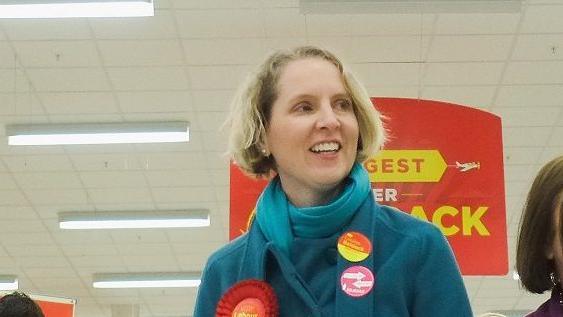New City minister's pro-China stance under scrutiny

Emma Reynolds returned to Parliament at July's general election
- Published
Downing Street has refused to say whether new City Minister Emma Reynolds is able to make decisions about the UK's dealings with China.
Reynolds was appointed by Sir Keir Starmer after the resignation of Tulip Siddiq amid growing pressure over an anti-corruption investigation in Bangladesh.
Questions have been raised about whether Reynolds has a conflict of interest, because she was a director of public affairs at a banking trade group involved in lobbying for fewer restrictions on Chinese businesses.
The prime minister's official spokesman repeatedly declined to say whether Reynolds' background meant she had to recuse herself, or step back, from decisions about China.
Siddiq investigation shows process is working - minister
- Published15 January
Chris Mason: Political heat map flashes red over Treasury
- Published15 January
Who is Tulip Siddiq?
- Published14 January
He said the new City minister "brings a wealth of experience to the role".
But he added: "When it comes to the process for the ministerial appointments, that will be followed in the usual way."
It comes as the UK government seeks closer financial services ties with China in an effort to boost economic growth.
Tulip Siddiq had been due to join Chancellor Rachel Reeves on a delegation to China last week, but remained in the UK to focus on clearing her name.
She was named last month in an investigation into claims her family embezzled up to £3.9bn from infrastructure spending in Bangladesh.
Her aunt is the former Bangladeshi prime minister Sheikh Hasina, who fled into exile after being deposed last year.
Siddiq announced her resignation on Tuesday, saying that although she had been cleared of breaking the Ministerial Code by the government's ethics adviser she did not want to be "distraction" to the government's mission.
Her replacement as Economic Secretary to the Treasury, Emma Reynolds, returned to Parliament in July after a four and a half year break, during which time she was the chief lobbyist for TheCityUK, which represents leading UK banks.
According to Bloomberg, external, Reynolds was involved in lobbying the then Conservative government not to include China in the "enhanced tier" of the Foreign Influence Registration Scheme.
The scheme, aimed at protecting the UK political system from covert foreign influence, was passed into law, but never implemented, by the previous government.
It has yet to brought into effect by the Labour government.
Reynolds' lobby group had argued that the "enhanced tier" - the strictest level of scrutiny - would have deterred investment from China and generated bad publicity.
The MP is also the former treasurer of the all-party parliamentary group on China.
Asked about potential conflicts of interests over her appointment, the prime minister's spokesman said: "There's an established process for the management of [ministers'] interests."
Ministers have to report any potential conflict of interests when they take up their posts, and these are published quarterly.
The prime minister's spokesman repeatedly declined to say whether Reynolds had been "ring-fenced" from making decisions about China as a result of this process.
Conservative shadow chancellor Mel Stride told BBC Breakfast Sir Keir should have "dealt with" Siddiq earlier as she had not been able to go on Rachel Reeves's China trip, a key part of her job.
He said the government was in "a rather curious situation" with her replacement, in relation to China.